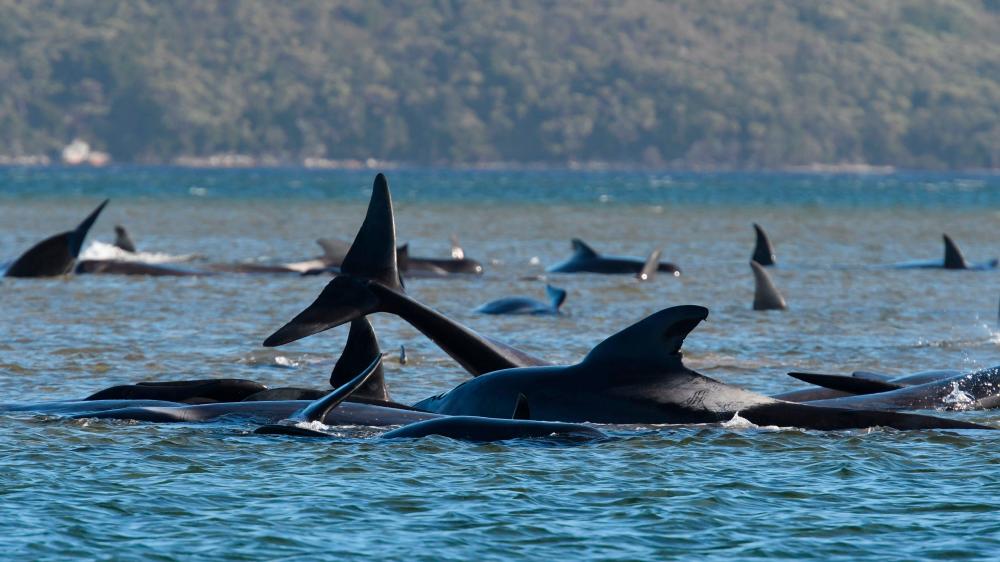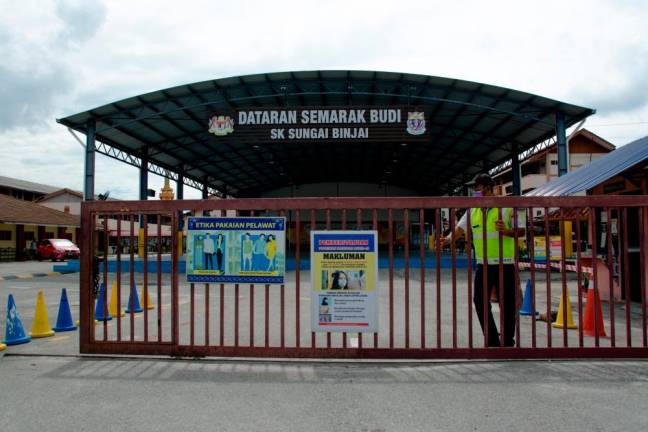UP TO to 90 whales have died after becoming stranded in a remote bay in southern Australia, with rescuers warning Sept 22 the mission to save another 180 still stuck will prove “challenging”.
Scientists said two large pods of long-finned pilot whales became stuck on sandbars in Macquarie Harbour, on Tasmania’s rugged and sparsely populated west coast.
Images from the scene showed shallow water thick with scores of the large slick-black mammals manoeuvering for space.
Rescuers could be seen wading in the water to reach the whales as they attempted to refloat them in deeper passages.
Government marine biologist Kris Carlyon said “about a third” of the 270 animals were dead by late Monday, and that rescuing survivors would be “challenging” task likely to take several days.
Though mass whale strandings occur relatively often in Tasmania, such a large group has not been seen in the area for more than a decade.
The animals are only accessible by boat, limiting the number of rescuers who can reach them.
About 60 people – including volunteers and local fish farm workers – are involved in the rescue attempt.
They are battling cold, wet conditions as well as the harbour’s unusual tides which are dictated by barometric pressure.
“In terms of mass whale strandings in Tasmania, this is up there with the trickiest,“ Carlyon told reporters in the nearby town of Strahan.
However, Carlyon said many of the partially submerged whales should be able to survive for the several days it would take his team to complete the task, in part due to the inclement weather.
“It’s pretty ugly for people on the ground but as far as the whales go its ideal –it’s keeping them wet, it’s keeping them cool,“ he said.
Carlyon said rescuers would still have to “triage” the whales, prioritising the healthiest and most accessible.
Notorious whale trap
Most of a 30-strong group on a nearby beach were found dead on Sept 21, while about 60 other whales on the sandbars are also believed to have since died.
Once the whales are returned to the water, Carlyon said, the biggest challenge will be herding the social creatures out of the sandbar-riddled harbour and back into the open ocean.
Scientists said it was unclear what caused the latest stranding, but Carlyon suggested the pod may have gone off track after feeding close to the shoreline or by following one or two whales that strayed.
Karen Stockin, an expert in marine mammals at New Zealand’s Massey University, said Tasmania was a “particular hotspot” for pilot whale strandings in large pods.
“It seems to be a notorious whale trap... you do tend to get these mass stranding events there,“ she told AFP.
Stockin said that while pilot whales were typically more resilient than other whale species, rescuers faced a race against the clock as the mammals can overheat, their muscles deteriorate and their organs become crushed outside their natural environment.
Their highly social nature was also expected to work against the rescue effort, she said, with some freed whales likely to re-strand themselves to remain close to the pod.
“Time is never your friend,“ she said. “So without doubt the more expedited rescue missions are, the more likely there is an increased (chance) of survival.”-AFP













